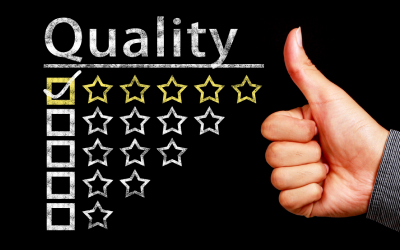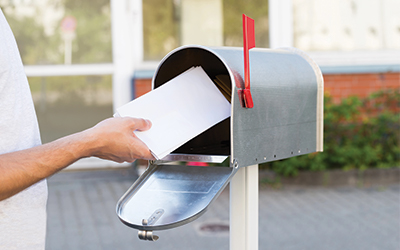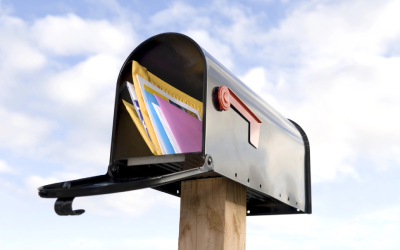Marketing during a crisis is full of uncertainty. The first thing many marketers think to do is tighten their belts. Dealing with a deadly pandemic like COVID-19 requires serious consideration of any and all options.
The effect on marketers thus far has been widespread. The cancellation of events of all sorts has resulted in a drop in direct mail that would otherwise promote them. The profound risks to travel have caused mandated cessations of services leading to a dearth of promotions. Cars aren’t selling. Restaurants, health clubs, and beauty salons are closed. The list goes on.
Small businesses, offices, and factories are at a virtual standstill. People are living and working under stay-at-home directives. So what is the point of marketing? Good question.
Silence Is Certainly Not Golden
Invest for the future. In situations like this the rational can seem irrational. There’s an old saying that goes, “When times are good you should advertise. When times are bad you must advertise.” There are consequences associated with pulling the marketing plug. Companies that reduced brand marketing budgets for an extended period of time before ramping back up suffered setbacks to customer relationships, sales, profits, and market share. Conversely, businesses that increase marketing activities during a downturn can see increases to all of these both during the downturn and continuing into the recovery.
Marketing during a crisis does not preclude taking necessary fiscal precautions. It does discourage silence. To borrow a timely nugget of investment wisdom, selling out in a downturn just locks in losses. A study that came out on the heels of the 2009 Great Recession took a look back as far as the 1920s for some perspective on this question.
Protect your turf. Think top of mind awareness. It manifests when people are asked “Where do you get (blank) when you really need it?” If the first brand they mention is yours, rest assured, the competition is gunning for you. Call it “mindspace”, brand equity, loyalty, or whatever you like. It is an investment that must be protected for the long term. If a brand name disappears from view at the first sign of financial pressure, or if external events interrupt normal operation, what message does that send? Competitors then have a clear lane to entice otherwise loyal customers away.
If your customer base cares primarily about price, especially for staple items and services, don’t allow the competition to distract them with promises of a better deal. Price-sensitive customers are more volatile than those that are brand loyal. Especially in tough times, reassurance that a business understands what is important to them is crucial to keeping them. How better to do this than with direct marketing that features aggressive pricing and loyalty based incentives? Pre-empt any who “dare to compare”.
MaaSS (Marketing as a Societal Service)
People still want to hear from the brands they relate to during good times and normal life. Whether you grew up on quirky VW’s “Think Small” ads, the iconic Apple 1984 spot, “Got Milk”, or the GEICO Gecko, touching, relevant advertising will always be part of our social fabric. While everyone practices social distancing, these cultural touchstones bring us together. Targeted marketing communication goes directly to our needs and emotions.
That’s a key point. If the decision is made to go forward with a direct marketing campaign, it pays to take a moment to be introspective. That may come off a bit touchy-feely, but at a time like this it’s worth it to consider what a business really does. Among the points any strategy brief should include is how the message solves problems and adds value to whatever the recipient is experiencing.
Target marketers may sell everything from popcorn to condominiums. By buying directly, shoppers don’t have to leave home to obtain the goods, services, and information they require (or simply want), which looms larger when they can’t. At a time like this, direct marketing empowers buyers to take action and accomplish goals, while reducing a sense of privation or isolation.
Direct Marketing Connects Us
When people are staying close to home, including for work, their mailbox is a kind of window to the world. The fact that they count enough for someone to send something takes on more weight. But be advised, it had better be relevant to what they think, feel, and need in the current moment. Under duress, everyone’s radar is attuned to insincerity. Be sure that all contact data is accurate. Especially reaching executives and business decision makers working at home. This is true now or anytime.
Search engine marketing can be productive, especially organic search. SEM reaches businesses and consumers when they are in need. It includes people in all stages of their customer journey, from discovery to purchase. With so many people operating from their homes, search will be an even more important part of their lives. It provides a way they can engage in “retail therapy” and still indulge their wants as well as needs. If nothing else, people tend to use search in times of scarcity.
Email marketing remains a powerful way to reach customers and prospects. All they need to do is open a message and click on a CTA to satisfy their interest. The number of global users is projected to top 4.3 Billion by 2022. Email is ingrained in the daily behavior of audiences from every industry and segment of the consumer marketplace. It is not unusual for users to check their personal email account 10 or more times a day. Business users and consumers alike open and transact via email from relevant, trusted senders.The ROI of email marketing is as strong as ever, generating $38 for every $1 spent.
In all, this is a good time to do everything possible to build site traffic and add to that opt-in email list for the brighter direct marketing future to come.
Take A CAN DO Attitude
In this time of restricted home behavior:
- You can’t take those zumba classes, but you can take long walks.
- You can’t go to restaurants, but you can prepare great meals at home.
- You can’t visit a botanical garden, but you can work in your own garden.
Working remotely, the same principle applies:
- You can’t open your store to customers, but you can open an online storefront.
- You can’t attend team meetings, but you can run an online collaboration platform.
- You can’t teach students in class but you can deliver instruction to their homes.
For each activity people can do there are things they will need to facilitate a different kind of home life and work. That’s why are actually business categories that are experiencing increased activity. These include garden essentials, DIY products, and home products and furnishings. Electronics and telco services are also up. People who are spending more time at home are doing the things and buying the necessities they need to stay busy and connected to work, family, and friends.
Resources On COVID-19 Effects On Business & Behavior
- Dun & Bradstreet offers a good deal of perspective on the impacts of coronavirus on global business.
- Check out this list of Fast Facts detailing the effects of the coronavirus outbreak on various industries worldwide. It includes industries getting crushed as well as those experiencing growth.
- With so many at home, Nielsen reports CPG sales in store and online are growing at a high rate.
- A global study conducted by Unruly examined the many ways the COVID-19 outbreak has changed behavior. 49% of respondents said they want to receive brand messages that are “informative”. 37% want brand messages that are “warm and happy”. 33% want inspirational content. A recurrent theme is people wanting to know how brands are supporting their workers.
- A Bouncex COVID-19 Retail Pulse Data Report finds that since March 1, website visits and email interactions are up globally.
- Common Thread reports on the pandemic’s effect on e-commerce.
In Conclusion:
Some have suggested that the current crisis is not a financial cataclysm like 2008, but a global health crisis that forced a voluntary shutdown of economic activity. That may be true, but the resulting economic damage is sure to be profound.
It will take an all hands on deck approach to getting back up to speed. Marketing silence amounts to capitulation. Marketing is one of the forces that will fuel the coming recovery. Perhaps then, economic activity may be able to recover to a meaningful level sooner rather than later. In any case, nobody wants to be left behind when the competitive juices of capitalism fully flow, including direct marketing.




